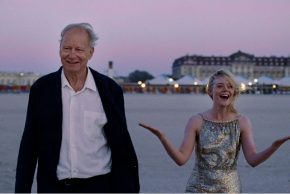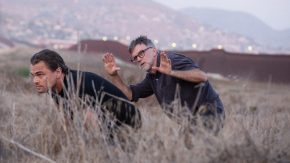“I think the way to look at it is musicians have always listened to other kinds of music. There’s never been a time when people have stayed in one place and not travelled, traded or migrated. So there has never been any such thing as a pure’ form of music. The more I study, the more I realise there are ancient links between all kinds of music.”
These are Justin Adams’ words, who has probably been asked many-many times why he plays the music he does. Born in London, in his biographies he is usually referred to as ‘English guitarist and composer’, but as a young child he spent a number of formative years in Egypt, too, where his father worked as a diplomat. He started his musical career in the new wave band The Impossible Dreamers, and then played with legendary bassist Jah Wobble in his post-punk band Invaders of the Heart. This laid the foundations for his later involvement with other big names: he recorded four albums with Robert Plant, and worked with musicians like Sinead O’Connor, Brian Eno or Ben Mandelson.
His name comes up so often as part of collaborations that some music critics have suggested that he may not be getting the attention and appreciation he deserves. His first solo album, Desert Road, released in 2000, is a nod to his childhood memories of the music and cultural treasures of North Africa. A year later, he had been touring among Mali’s traditional singers (or griots), bought himself a Tuareg instrument called ngoni, and participated in the making of Tuareg band Tinariwen’s first album. While maintaining contacts in Europe and the US, he also found musicians in Africa with whom they mutually inspired each other. These included Rachid Taha from Algeria, Juldeh Camara from The Gambia and Rouicha from Morocco.
Then one day he played with Italian musician Ludovico Einaudi. It turned out that Einaudi also had his own regular collaborator: a young boy who was not only a fellow musician, but at the age of 26 he was already working as an assistant in organising the world-famous music festival Notta della Taranta. Justin Adams became interested in this certain Mauro Durante, and the more he heard about his career so far, the more certain he was that they should work together.
“Mauro, to put it bluntly, ‘had no choice’. Not only because his father put him on the stage when he was a little child alongside some of the best international musicians invited in Salento, but mostly because he soon realized blood and music were flowing through his veins. Being a musician was just inevitable.”
This is how a journalist describes him. And indeed, at the age of 14, Mauro Durante joined his parents’ orchestra, Canzoniere Grecanico Salentino, where he played drums and violin, and later inherited the bandleader’s role from his father. He has been a regular performer at the Notta della Taranta, and a constant student of Italian folk music, the traditions and ritual contexts that intertwine song and dance, and even of the role of the tarantula’s bite; because dancing has been seen as much as a symptom as a treatment of the venom.
This is why the music is called tarantella, and a sub-variety of it is the pizzica, of which Durante, following in Einaudi’s footsteps, has mastered. He and Adams soon discovered the common ground between the music of the two sides of the Mediterranean. Indeed, the melodies of southern Italy and North Africa, the tireless rhythms, the sometimes slow lyrical, sometimes wildly lilting chants, not only fit together well but, to refer to the above Adams quote again, have been mutually influencing each other over centuries.
The two musicians’ first joint album, Still Moving, is surely just the beginning of a long journey together that will continue to draw on a wide range of cultural influences, deep emotions and brilliant musical solutions.
At their concert at Müpa Budapest on 18 April, you can hear how well they sound together…

























Comments